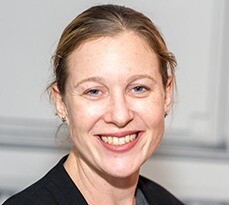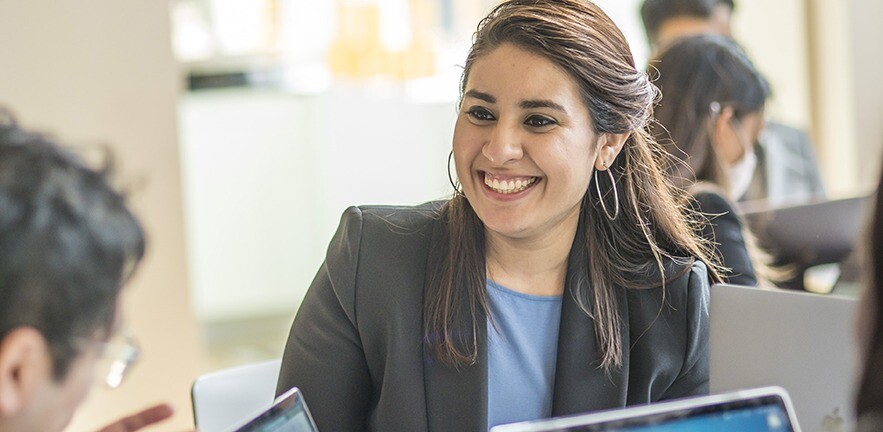What is mentoring and how do you go about creating a strong relationship, as mentor or mentee, to bring value for you and others? We speak to experienced mentors and a lecturer at Cambridge Judge Business School, Thomas Roulet, to identify some key pointers.

“Mentors help you to navigate your way through your career, but they can also become your strongest advocate”, says Dr Thomas Roulet, Associate Professor in Organisation Theory at Cambridge Judge and Deputy Director of the Cambridge MBA.
“As organisations become more complex and career paths are increasingly non-linear, the role of mentoring has changed to become more fluid. The traditional top-down of a senior mentoring a junior colleague has many benefits, but it is not the only way.”
Give and take
Thomas encourages MBA students to seek out mentoring roles as well as identifying potential mentors to advance their own career path. “Motivation – bringing out the best in people – is a key leadership skill. And through mentoring, students learn how to connect meaningfully with people and value other people’s point of view.”

That was certainly the experience for Tarek Mosfi (MBA 2019/20), now leading the establishment of the Dubai office of management consultancy company, Visagio, who answered a call-out from the Cambridge Women in Business Mentoring programme during his MBA year. “I was connected up with an undergraduate from South-East Asia, who was reluctant to follow an expected career path into finance and consulting, which she did not see as a force for good.
“I suggested to her that her acquired business skills could be put to good use in the not-for-profit or NGO sector. And later I was very gratified to hear that when she graduated that is where she went to work!”
Tarek volunteered as he wanted to give something back, but soon appreciated that the soft skills he was learning on the Cambridge MBA programme complemented his efforts to be a good mentor. “I intend to keep acquiring new mentors as I move through my career, as well as mentoring others, and being part of the University of Cambridge community certainly helps.”
Guide the process, not the outcome
As a mentor, it’s key to guide your colleague through the process of decision-making. “You both soon realise that there is no perfect decision, action, or outcome.” says Tarek. “Just as there is no perfect mentor. We all build storylines in our head and the reality does not always match. But as long as you can build a relationship of psychological safety together, then the experience is invaluable. Mentoring is about leadership and communication, but it is not your role to tell the individual to do this or that.”
Approach with clarity
When reaching out to a mentor it is important to first have clarity on who you are, what you have already achieved and where you are looking for a helping hand. “The most common mentoring relationships for our MBAs are industry or skill specific – coding, product development, start-ups or the tech industry as examples.” says Thomas Roulet.
“Through the Cambridge Venture Project in their first MBA term, students get the opportunity to work with an experienced business mentor, and later in the Global Consulting Project they are assigned academics to mentor the team. If students are smart, they reach out to mentors with clear career path objectives. I think it is important to focus on that initially rather than the identity of individual mentors.”

Kate Jackson Wendelboe (MBA 2011), Cambridge MBA alumna, echoes this from her own experience. “Sometimes you need a very specific match in your experiences. I remember being encouraged to apply for a promotion during my second maternity leave. As a working mother herself, my mentor at the time was able to share practical tips that convinced me to go for the job.”
Regularly approached herself to act as a mentor, Kate, now Head of Strategy at BT Security, encourages mentees to think hard about what they are looking for. “It might be a skills match, or knowledge about a particular industry. It’s not always about hierarchy – I have benefitted from reverse mentoring, when I was paired with an apprentice working in the same part of the organisation.”
Be open to a long-term relationship
Once you have found a good match, stick with it, is Thomas’s advice. But be prepared for the relationship to change over time. A former investment banker, he remains in touch with the senior female employee who took him under her wing when he first started out.
“These days, she makes me aware of the issues women face in investment banking, which in turn informs my teaching and helps my students. Some mentors may be for life, but a good mentor will want you to branch out and improve away from them, even to do better than them.”
Kate adds that “a successful mentoring relationship is all about personal chemistry and the trust you build up. I was lucky that in my early work experiences I had managers who were very open to mentoring me. Also, I still view several of my tutors on the MBA as my mentors.
The mentoring mindset was a thread throughout my MBA and that is reflected in the strength of the global CJBS alumni network. Today I have no hesitation in reaching out to another former CJBS student if I need guidance in a specific sector or with a particular issue. Which is in itself is a form of mentoring”.
Tough love
Some mentors of course, are needed to give you the motivation in the first place. Tarek Mosfi had a hard time in his first term as an engineering undergraduate at the American University in Dubai. An ‘A’ level student, alongside his undergraduate studies he had to take US High School exams to justify his conditional place. Just as Tarek was about to throw in the towel, the Dean of the School became involved and suggested he was a quitter.
“I did not like that at all, but he gave me the self-confidence to get on with it and pass the exams. Later he taught me in my second and third years, remembered the episode and became my mentor. He was enormously helpful with my first graduate applications.”


